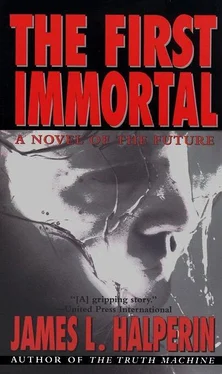Gary nodded, his countenance a mirror of Father Steve’s: achievement, anxious excitement, and regret—all commingled. Although he’d neglected to set his wristband on “Document,” Gary now retained every nuance of today’s sunrise, just as he’d memorized The Dawn of Life itself. Beyond any doubt, each would complete the other. It was almost over, nearly time to let the public submit its verdict.
“Yes,” he said, “that was the one.”
They headed back into the bay, each still absorbed in the significance of today’s milestone. Only Father Steve sensed the swell’s approach, and had no time to scream. Therefore Gary was taken completely by surprise when the surge, tall as the men and higher than the boat’s freeboard, reached them.
Their flimsy skiff was no match for the force of the roller, which slammed into it like a boy kicking an empty Coca-Cola carton. The two men were hurled twenty yards into the merciless ocean, with 1.6 miles of 37 degree Fahrenheit waters separating them from shore. A heavy current sucked them under.
By triangulating on life-monitor distress signals from the wristband of one of the drowning men, a medevac gyrocopter crew managed to locate them within minutes. Undersea robots deployed from the chopper would raise their bodies from thirty-eight feet below the surface, one hour and fifty-nine minutes later.
August 12, 2034
—A series of 28 virtual reality probes lands in Mercury’s twilight zone. Within 16 days, astronomers from the U.S., Russia, India, and China intend to set up interactive environments on Earth to faithfully duplicate the surface conditions of various regions on the innermost planet of our solar system. Later this decade, similar probes, each individually designed to function in its intended non-terrestrial environment, will be sent to Venus, Jupiter, Saturn, Neptune, and each of their moons.—The United States becomes the last nation on Earth to legislate the insertion of routine, permanent contraceptive implants at birth. Before becoming pregnant, couples throughout the world must now pass a basic parenting test, and prove themselves competent, in order to obtain routinely granted procreation licenses and prophylactic overrides for both partners.
My grandmother, Rebecca Crane, settled into her front-row seat to watch me, her only breathing descendant, deliver an address in Los Angeles. Supersonic subways would not emerge for nearly five more years, but travel was already becoming easier. Including transportation to and from airports, getting to the auditorium had consumed barely ninety minutes, and her return to Boston would require only eighty-five. Still, I was touched that she came. Grandmother hated to fly, of course. Too many painful memories.
Even with the passing of nineteen years, the irreversible loss of my father, her only son, had lost only its daily sting, becoming a duller but chronic discomfort, a cancer in her bones. Aunt Katie’s so-called suicide had been somehow easier for her; at least there had remained the prospect that someday she might return to the world of the living. My father’s death left no such hope. Becoming guardian to me after my parents’ tragedy, and raising me, may have somehow helped, too. I like to think so, anyway.
Now, at twenty-eight, I would be the next speaker at the Fourteenth Annual International Nanotechnology Conference. My invitation to deliver this keynote address had been unusual; eighty-two percent of INC lecturers this year were over fifty or under twenty. Only the older men and women could recount the genesis and history of nanotech and explore its emerging ethical and scientific disciplines. Youngsters, a solid five to ten years younger than I, were best at explaining how to design the machines, and how to create the redundant systems that precluded unpredictable and often dangerous mutations.
Grandmother watched vacantly as the aged nanotech pioneer, Dr. Marc Tarkington, concluded his talk, numbing her brain with his narratives of assemblers, disassemblers, and replicators; angstroms, carbyne chains, and memes; quantum mechanics, entropy, and the uncertainty principle. Her eyes were open but appeared unseeing, a condition she never displayed when listening to my public utterances, no matter how dry.
Was it because she loved me? I wondered. Or simply because I tried to make my lectures seem more conversational?
I’d been chosen to preach the political doctrine of the INC because I could express obscure concepts in accessible terms. At least that’s what they’d told me. But I suspected that, as far as INC officials were concerned, it was even better that I happened to be the son of a well-known, martyred politician. The promoters of the conference must have reasoned that my speech would both attract and stimulate the nano-illiterate masses.
“Before I tell you why nanotech was such a dangerous development,” I began, “let me first explain why it was possible to conceive it at all.
“Leonardo da Vinci envisioned heavier-than-air flight several centuries before it was ever accomplished. He thought it possible because he knew that birds, bats, and insects are heavier than air. Today no bird or bat can achieve even a remote fraction of the speed, power, or control of our modern machines of the sky.
“Late twentieth century scientists knew it was possible to build, on a molecular scale, machines with self-replicating, reversible, variable-speed motors a trillionth the size of those found in the children’s toys of those days, because common bacteria already possessed such motors. In fact, those found in bacteria are only slightly larger than today’s crude nanomotors.”
Even though she’d heard similar statements from me before, Grandmother’s expression seemed to reflect a spontaneous sense of wonder.
“Nobel laureate Richard Feynman stated—back in 1959, no less—that nanoassemblers were, quote, ‘a development which I think cannot be avoided.’ The greatest genius of mid-twentieth century physics foresaw both the benefits and dangers of molecular technology decades before his peers were even able to conceptualize its inevitability.
“Well before the new millennium, scientists were manipulating atoms and molecules as individual entities. In the 1980s, gene synthesis machines were already capable of sequencing single molecules, called nucleotides, to create short strands of DNA. In 1996 American scientists learned how to position individual molecules without damage, using flexible carbon nanotubes.
“It was also obvious to twentieth century scientists that we would someday create intelligences greater than our own. We knew even then that it was physically possible to build computers not just smaller and faster than the human brain, but also considerably more powerful. After all, smaller means faster. A human arm can flap a hundred times per minute, while an insect wing, a thousand times shorter, can flap 100,000 times.
“Furthermore, electrical energy travels at a million times the speed of human nerve impulses.”
Grandmother raised a questioning eyebrow. Even educated adults were often unaware of this startling fact, although by 2034 schoolchildren invariably knew it.
“Indeed we would actually possess the technology, before the turn of the millennium, to simulate the workings of a human mind. We were limited not by abstract knowledge but by the enormous space and funding required to build a slow and commercially unwarranted electronic brain.”
Grandmother’s eyes came alive. I imagined she was recalling the forward march of computer technology during her own early years. She had never even owned a PC until she’d reached her thirties. Her first machine had been torturously slow, couldn’t respond to speech, and covered most of her desk! Nowadays six-year-old kids were wearing a hundred times more computing power in their belt buckles or their pinkie rings.
Читать дальше












